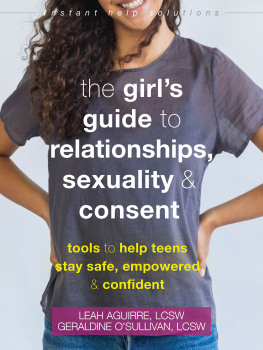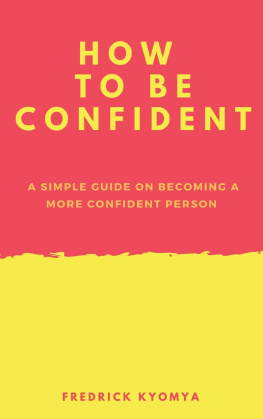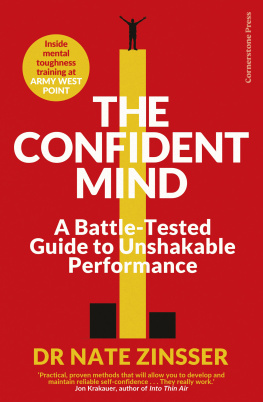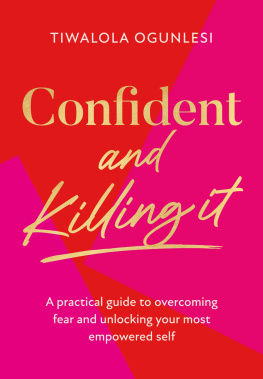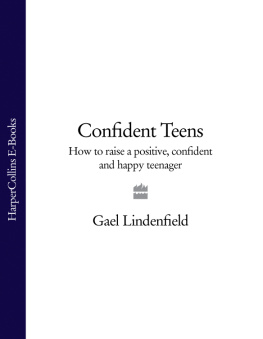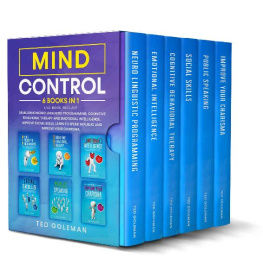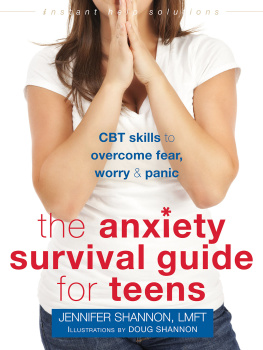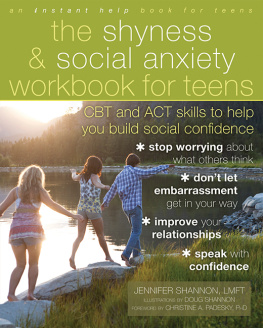Marci G. Fox, PhD, is a licensed psychologist, expert in cognitive therapy, internationally recognized speaker, and coauthor of Think Confident, Be Confident. She is an adjunct faculty member at the Beck Institute for Cognitive Behavior Therapy and a founding fellow in the Academy of Cognitive Therapy who also serves on its board of examiners. Her private practice is in Boca Raton, FL.
Leslie Sokol, PhD, is a licensed psychologist, expert in cognitive therapy, acclaimed national and international speaker, and coauthor of Think Confident, Be Confident. She is a senior faculty member and past director of education at the Beck Institute for Cognitive Behavior Therapy and distinguished founding fellow, past president, and credentials chair of the Academy of Cognitive Therapy. Her private practice is in the Philadelphia suburbs.
www.thinkconfidentbeconfident.com
www.cbtexperts.com
Foreword writer Aaron T. Beck, MD, is President Emeritus and founder of the Beck Institute for Cognitive Behavior, University Professor Emeritus at the University of Pennsylvania, and honorary president of the Academy of Cognitive Therapy.
Foreword writer Judith S. Beck, PhD, is president of the Beck Institute for Cognitive Behavior Therapy and clinical associate professor of psychology in psychiatry at the University of Pennsylvania.

Publishers Note
This publication is designed to provide accurate and authoritative information in regard to the subject matter covered. It is sold with the understanding that the publisher is not engaged in rendering psychological, financial, legal, or other professional services. If expert assistance or counseling is needed, the services of a competent professional should be sought.
Distributed in Canada by Raincoast Books
Copyright 2011 by Marci G. Fox & Leslie Sokol
New Harbinger Publications, Inc.
5674 Shattuck Avenue Oakland, CA 94609
www.newharbinger.com
Cover design by Amy Shoup; Acquired by Tesilya Hanauer; Edited by Clancy Drake
All Rights Reserved
Printed in the United States of America
Library of Congress Cataloging in Publication Data
Fox, Marci G.
Think confident, be confident for teens : a cognitive therapy guide to overcoming self-doubt and creating unshakable self-esteem / Marci G. Fox and Leslie Sokol ; foreword by Aaron T. Beck and Judith S. Beck.
p. cm.
ISBN 978-1-60882-113-6 (pbk.) -- ISBN 978-1-60882-114-3 (pdf e-book) -- ISBN 978-1-60882-115-0 (epub)
1. Self-esteem in adolescence. 2. Self-confidence in adolescence. 3. Self-perception in adolescence. 4. Teenagers--Conduct of life. I. Sokol, Leslie. II. Title.
BF724.3.S36F69 2011
155.519--dc23
2011027078
To our children, Jesse, Ethan, Carly, Chad, Alex, and Max, with love
Foreword
Adolescence is a confusing and unsettling stage of life for many people, as they struggle to figure out who they are, what their place in the world is, and how they should relate to others. Teenagers often focus intensely on how they believe other peopleespecially their peersperceive them, and they frequently err in their assessments. If their perceptions are distorted, a cognitive approach can be quite useful in helping them correct their ideas and conclusions, allowing them to see reality more clearly.
If a typical teen, for example, is excluded from a party, her immediate thought is, My friends dont like me. A cognitive approach can help her in several ways. One, she can look for evidence that seems to support or contradict this idea. Have her friends, or some of them at least, done other things that make her think they dont like her? Have they showed her in different ways that they do like her? Two, the teen can look to see whether there are other likely explanations for why she might have been excluded. Three, she can decatastrophize the experience by asking herself, If it turns out they dont like me, how can I cope? What can I do? She can also consider the best outcome of the situation as well as the most realistic outcome. Four, she can assess the impact of telling herself that her friends dont like her and the impact of changing her thinking. Five, she can reflect on the advice she would offer someone else who was in this situation and had this thought. And, six, she can do problem solving, asking herself what it would be helpful for her to do, now and in the long run.
Whether or not her initial thought is valid, this teen will feel distressed if she overgeneralizes from this one situation, because it will affect her self-esteem and self-confidence. If she believes at heart that she is a likeable person, this situation may lead her to feel temporarily annoyed, hurt, or unhappy, but it will not change her basic view of herself. On the other hand, if she doubts her likeability, she may jump from My friends dont like me to No one really likes me to Im unlikeable. Cognitive techniques can help her evaluate these conclusions as well.
This book, written by our two excellent colleagues, helps teens who may continually misinterpret situations and interactions and then see themselves in unrealistically negative ways. If only all adolescents were taught to identify their thoughts (especially the thoughts about themselves) that lead to distress, to recognize that their thoughts are ideas and not necessarily truths, to evaluate their thoughts, and to respond effectively to them. There would be far less emotional angst and dysfunction in adolescents and far greater opportunities to weather the usual storms of adolescence with equanimity.
Aaron T. Beck, MD, president, Beck Institute for Cognitive Behavior Therapy and university professor emeritus, University of Pennsylvania
Judith S. Beck, PhD, president, Beck Institute for Cognitive Behavior Therapy and clinical associate professor of psychology in psychiatry, University of Pennsylvania
Acknowledgments
We owe a gigantic thank you to our terrific children. Jesse, Ethan, and Carly Fox, thank you for your unflagging support and enthusiasm. Chad, Alex, and Max Detweiler, thank you for sharing your personal stories and supplying us with a constant source of editorial help with technical language and expressions. A special thank you goes out to all of their classmates and friends from Germantown Academy who shared their struggles, insights, and innermost thoughts and feelings. Our biggest thank yous go to our amazing husbands, Stu and Bob, who held down the fort so we could devote the time to writing this book. We are so lucky to have you in our lives.
We also want to thank other family members and friends for generously lending their expertise and support, including Jodi Sokol, Liane Browne, and Doris Schwartz, for their fastidious technical editing; Marvin S. Gittes for his legal expertise; and Margaret Gittes, Stephen Schwartz, Geri and James Davis, Alvin and Esther Fox, Mark Likness, Marc Sokol, and Phyllis and Arnold Sokol. We are extremely appreciative of our brilliant colleagues Cory Newman and Emily Becker-Weidman, and thank them for their positive feedback, encouragement, and useful editorial comments. Thank you to Julie Snow Reagan and Brian Keenaghan for always being there with technical support.
We also feel so fortunate to have Anne Marie OFarrell as our agent. Thanks for always being there, believing in us, and fighting for us. Thank you to our talented team of editors, Tesilya Hanauer, Jess Beebe, and Nicola Skidmore, for all the time, energy, and hard work you put into helping shape this book to be even better. Sincere gratitude to Clancy Drake for expertly and carefully polishing our work. Youre so talented. Thanks to Leslie Davis Guccione, our teen whisperer. You are an amazing person and editor. And we could not write this or any book without recognizing our debt to the father of cognitive therapy, Aaron T. Beck, whose work has inspired so many of us.


